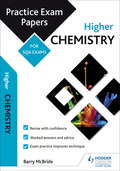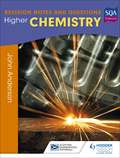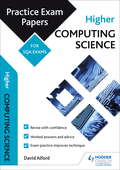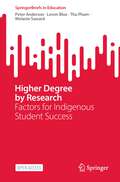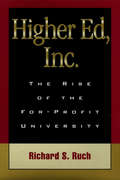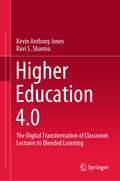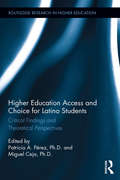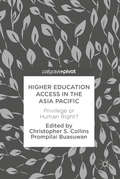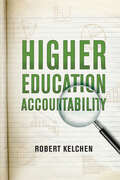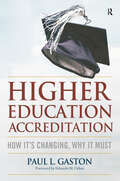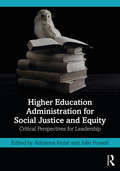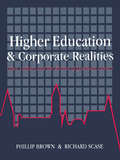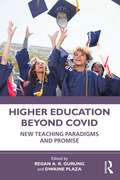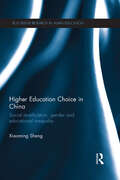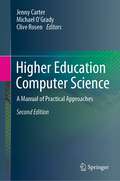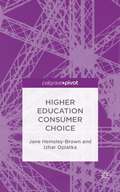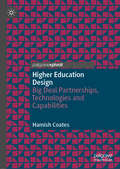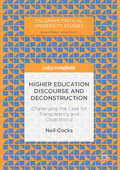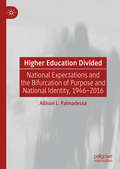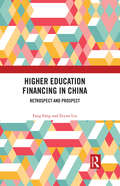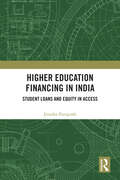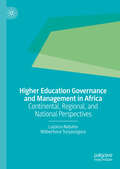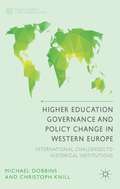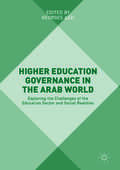- Table View
- List View
Higher Chemistry: Practice Papers for SQA Exams
by Barry McbridePractise for your SQA exams with three specially-commissioned Hodder Gibson Practice Exam Papers.- Practise with model papers written and checked by experienced markers and examiners- Get extra advice with specially-written study-skills guidance sections- Gain vital extra marks and avoid common mistakes with examiner tips
Higher Chemistry: Revision Notes and Questions
by David Calder John AndersonThe perfect revision companion to the Higher Chemistry textbook, this newly written resource reflects the very latest SQA curriculum.This book offers bite-sized facts, worked examples and a variety of question types to support and reinforce learning and practice for the final examination.- Dedicated sections on numeracy and researching chemistry- Provides a broad range of questions, including open-ended and past SQA exam questions- Answers section allows students to check their understanding of the standards required for Higher level success
Higher Chemistry: Second Edition Epub
by John AndersonExam Board: SQALevel: HigherSubject: ChemistryFirst Teaching: August 2018First Exam: June 2019Full course coverage in this new Higher Chemistry textbook, updated for the latest changes to the SQA coursework and question papers.- In-text, Study and End-of-course questions have been updated and extended in this edition, testing students' knowledge and understanding of the chemistry presented and offering lots of practice to revise and consolidate ahead of the exam.- Worked examples show common Higher Chemistry questions and ways of answering that cover the necessary points- Checklists for Revision provide short summaries of the key learning points at the end of each chapter so that students can this to self-check their learning which helps them revise for assessments- Brand new section 'Additional features of the Higher Chemistry exam' offers advice on how to tackle two important new features of the exam: Numeracy and Open-ended questions- Key terms and Chemical Dictionary aid understanding and allow students to check their knowledge of the key terms
Higher Computing Science: HCOMPPEP
by David AlfordPractise for your SQA exams with three specially-commissioned Hodder Gibson Practice Exam Papers.- Practise with model papers written and checked by experienced markers and examiners- Get extra advice with specially-written study-skills guidance sections- Gain vital extra marks and avoid common mistakes with examiner tips
Higher Degree by Research: Factors for Indigenous Student Success (SpringerBriefs in Education)
by Peter Anderson Levon Blue Thu Pham Melanie SawardThis open access book provides insights from Indigenous higher degree research (HDR) students on supervision practices in an Australian context. It examines findings from qualitative studies conducted with Indigenous HDR students from different academic disciplines, enrolled higher education institutions across Australia, and supervisors of Indigenous HDR students. Six types of data and their thematic analyses are presented, to understand the needs and experiences of both Indigenous HDR students and supervisors of Indigenous HDR students. This book also unpacks assumptions and commonly held beliefs about Indigenous HDR students, and shares what Indigenous HDRs report they need to experience success in higher education. It reports the experiences of supervisors of Indigenous HDR students, and explore further opportunities which enhance the higher education experiences of Indigenous HDR students. This book also suggests how successful relationships between Indigenous HDR students, and their supervisors may be fostered, and aims to be a useful resource for Indigenous peoples wishing to pursue higher education, and HDR supervisors in countries with Indigenous populations.
Higher Ed, Inc.: The Rise of the For-Profit University
by Richard S. RuchWinner of the 2002 Alice L. Beeman Research Award for Outstanding Writing about Communications from the Council for Advancement and Support of EducationAmong higher education institutions in the United States, for-profit colleges and universities have steadily captured a larger share of the student market. A recent trend at for-profit institutions is the coupling of job training with accredited academic programs that offer traditional baccalaureate, professional, and graduate degrees. Richard Ruch, with administrative experience in both the nonprofit and for-profit sectors of higher education, takes us inside these new for-profit institutions, describing who teaches there, who enrolls and why, and how the for-profits are managed and by whom. He analyzes their different structures, services, and outlook on higher learning and training, and explains in detail how they make profits from tuition income.In Higher Ed, Inc., Ruch opens up the discussion about for-profit higher education from the perspective of a participant-observer. Focusing on five providers—the Apollo Group (the University of Phoenix); Argosy Education Group (the American Schools of Professional Psychology); DeVry, Inc. (DeVry Institutes of Technology); Education Management Corporation (the Art Institutes International); and Strayer Education (Strayer University)—he conveys for the first time what it feels like to be inside this new kind of American institution. He is also candid about the less attractive aspects of the for-profit colleges, including what those who enroll may give up. As Ruch makes clear, the major for-profit colleges and universities offer a different approach to higher education—one that may be increasingly influential in the future.
Higher Education 4.0: The Digital Transformation of Classroom Lectures to Blended Learning
by Kevin Anthony Jones Sharma RavishankarThis book chronicles a 10-year introduction of blended learning into the delivery at a leading technological university, with a longstanding tradition of technology-enabled teaching and learning, and state-of-the-art infrastructure. Hence, both teachers and students were familiar with the idea of online courses. Despite this, the longitudinal experiment did not proceed as expected. Though few technical problems, it required behavioural changes from teachers and learners, thus unearthing a host of socio-technical issues, challenges, and conundrums. With the undercurrent of design ideals such as “tech for good”, any industrial sector must examine whether digital platforms are credible substitutes or at best complementary. In this era of Industry 4.0, higher education, like any other industry, should not be about the creative destruction of what we value in universities, but their digital transformation. The book concludes with an agenda for large, repeatable Randomised Controlled Trials (RCTs) to validate digital platforms that could fulfil the aspirations of the key stakeholder groups – students, faculty, and regulators as well as delving into the role of Massive Open Online Courses (MOOCs) as surrogates for “fees-free” higher education and whether the design of such a HiEd 4.0 platform is even a credible proposition. Specifically, the book examines the data-driven evidence within a design-based research methodology to present outcomes of two alternative instructional designs evaluated – traditional lecturing and blended learning. Based on the research findings and statistical analysis, it concludes that the inexorable shift to online delivery of education must be guided by informed educational management and innovation.
Higher Education Access and Choice for Latino Students: Critical Findings and Theoretical Perspectives (Routledge Research in Higher Education)
by Patricia Perez Miguel CejaNow the largest and fastest-growing ethnic population in the U.S., Latino students face many challenges and complexities when it comes to college choice and access. This edited volume provides much needed theoretical and empirical data on how the schooling experiences of Latino students shape their educational aspirations and access to higher education. It explores how the individual and collective influence of the home, school and policy shape the college decision-making process. This unique collection of original scholarly articles offers critical insight on educational pathways that will help families, educators and policy makers intervene in ways that foster and sustain college access and participation for Latino students. It considers destination preferences and enrollment selections, elementary and secondary school experiences, and intervention programs that shed light on how practitioners can promote participation and retention. This multi-conceptual, multi-methodological volume offers directions for future research, programming and policy in Latino education.
Higher Education Access in the Asia Pacific
by Prompilai Buasuwan Christopher S. CollinsThis edited volume offers empirical, evaluative, and philosophical perspectives on the question of higher education as a human right in the Asia Pacific. Throughout the region, higher education has grown rapidly in a variety of ways. Price, accessibility, mobility, and government funding are all key areas of interest, which likely shape the degree to which higher education may be viewed as a human right. Although enrollments continue to grow in many higher education systems, protests related to fees and other equity issues continue to grow. This volume will include scholarly perspectives from around the region for a more extensive understanding of higher education as a human right in the Asia Pacific.
Higher Education Accountability
by Robert KelchenThe first comprehensive overview charting the accountability of higher education.As the price tag of higher education continues to rise, colleges and universities across the country are under increasing pressure to demonstrate their value. Graded on numerous metrics, including cost and ability to prepare students for the job market, colleges must satisfy requirements from multiple stakeholders. State and federal governments demand greater accountability. Foundations and private donors, as well as today's parents and students, approach education with a consumer sensibility. How can colleges navigate these pressures while trying to stay true to their missions and values? In Higher Education Accountability, Robert Kelchen delivers the first comprehensive overview of how colleges in the United States came to face such overwhelming scrutiny. Beginning with the earliest efforts to regulate schools, Kelchen reveals the rationale behind accountability and outlines the historical development of how federal and state policies, accreditation practices, private-sector interests, and internal requirements have become so important to institutional success and survival. With so many diverse and conflicting entities holding colleges responsible for their performance, the variety of accountability systems in play can have both intended and unintended consequences. Immersed as they are in current debates about how best to respond to these pressures, faculty and administrators will welcome this up-to-date and timely account, which offers not only a look at current practices but also an examination of the future of accountability in American higher education.
Higher Education Accreditation: How It's Changing, Why It Must
by Paul L. GastonIs the accreditation system “broken” as claimed by successive Secretaries of Education and some recent reports? This book addresses this question head-on, asking whether accreditation is indeed in need of radical reform, and whether the agencies’ authority should be curtailed; or whether in fact the changes now underway – that accrediting agencies contend ensure rigorous and consistent standards and degrees that are a reliable gauge of student attainment – are moving the academy and the nation in the right direction. In a sweeping and ambitious book, Paul Gaston deploys his knowledge and experience as a peer reviewer for three regional accrediting agencies, a former board member and chair of the Association of Specialized and Professional Accreditors, and his involvement in the early stages of the Council for Higher Education Accreditation, to go beyond the polemics to explore whether a strategy that builds on the emerging values and good practices can achieve the substantive and positive improvements the public is demanding.As an introduction for readers new to the debate, he provides a brief overview of the development of accreditation, its terminology, and structure, describing how it currently works, and what it has achieved; and offers insight into the proliferation of the missions of accreditation – as well as the multiplicity of stakeholders with an interest in its outcomes – to question whether the mandate of accreditation should, as some contend, be expanded, or particular missions reassigned or abandoned. This established, he undertakes a dispassionate analysis of the arguments and recommendations of critics and supporters of the current direction of accreditation to identify common ground and explore constructive ways forward, paying specific attention to current and potential reforms of the three sectors of higher education accreditation: the seven regional accrediting associations, the national accreditors, and programmatic, or “specialized” accreditation. The book concludes by outlining a comprehensive approach to reform. His proposal would preserve practices that already work well while advancing important changes that can be incrementally implemented. The result would be a higher education accreditation structure more cost effective, more efficient, more transparent and accountable, and more responsive to institutional and public needs.
Higher Education Administration for Social Justice and Equity: Critical Perspectives for Leadership
by Adrianna Kezar Julie PosseltHigher Education Administration for Social Justice and Equity empowers all administrators in higher education to engage in their work—to make decisions, hire, mentor, budget, create plans, and carry out other day-to-day operations—with a clear commitment to justice, sensitivity to power and privilege, and capacity to facilitate equitable outcomes. Grounding administration for social justice as a matter of daily work, this book translates abstract concepts and theory into the work of hiring, socialization, budgeting, and decision-making. Contributed chapters by renowned scholars and current practitioners examine the way higher education administration is organized, and will help readers both question existing structures and practices, and consider new and different ways of organizing campuses based on equity and social justice. Rich with case studies and pedagogical tools, this book connects theory to practice, and is an invaluable resource for current and aspiring administrators.
Higher Education And Corporate Realities: Class, Culture And The Decline Of Graduate Careers
by Phillip Brown Richard ScaseA new approach to the analysis of cultural reproduction focusing on the impact of economic change. The book demonstrates the reinforcement of cultural stereotypes in recruitment caused by interaction between corporate restructuring and the education system.; This book is intended for academics, postgraduates and advanced undergraduates in sociology with an interest in the sociology of work and the sociology of education as well as researchers and students within human resource management and cultural studies.
Higher Education Beyond COVID: New Teaching Paradigms and Promise
by Regan A. R. GurungThis book illustrates how higher education responded to the COVID-19 pandemic and grew from it. The pandemic impacted faculty development, drew a greater focus on the measurement of effective teaching in higher education, and provided a better understanding of what was needed to better aid educators in colleges and universities nationwide. The stage is set for a more resilient higher education with chapters illustrating new paradigms and promise. Three themes are highlighted throughout this volume. Authors underscore the need to explore different modalities of delivery for faculty development and instruction, to enhance the leverage of technology in course design, and to refine faculty development for holistic development. Pulling together empirical data on college faculty administration, and student responses to the pandemic, chapter authors address the unique issues faced by educators and highlight successes and challenges in working with existing Centers for Teaching and Learning (CTLs) and information technology structures. Featuring contributions from diverse institutions, each chapter provides specific guidelines and recommendations for higher education to set the stage for innovation and change. Laying the groundwork for the design of more effective models of faculty development for higher education, this book is a valuable resource for higher education administrators and faculty to improve higher education going forward.
Higher Education Choice in China: Social stratification, gender and educational inequality (Routledge Research in Asian Education)
by Xiaoming ShengMuch of the existing research on parental involvement and higher education choice examines the difference between the working class and the middle class, but little literature looks at different factions within the social classes. This book discusses higher education choice in China, particularly through the examination of social issues such as social stratification, parental involvement, and gender and educational inequality. Drawing from an empirical study based on Bourdieu’s theory, the book explores both inter-class and intra-class differences in China, providing an insight into how social class differences influence a number of issues, including: educational equality the role parents, especially mothers, play in higher education decision-making the relationship between traditional cultural norms gendered relationships within Chinese families. The sociology of higher education choices are derived through feedback from various sources, including both parents and students themselves. The book will be key reading for postgraduates and researchers in the fields of sociology, sociology of education, Chinese studies and Asian studies.
Higher Education Computer Science: A Manual of Practical Approaches
by Jenny Carter Michael O’Grady Clive RosenThe march towards on-line and blended teaching—present before the Covid-19 pandemic—has been accelerated by it, and there is no going back. Students and staff may object, but the economic drive towards “greater productivity” will inevitably result in less face-to-face (f2f) instruction. Therefore, it is incumbent for those delivering this precious, in-person resource to make maximum use of time…which raises the question, “how”?The second edition of Higher Education Computer Science offers some potential answers. It also addresses other questions, such as “why have f2f teaching at all?” “what is the purpose of f2f?” and “what is the appropriate balance between the two?” The first edition began to offer suggestions for optimising limited opportunities to get together with students. Aligned with that, this unique new volume examines how to use the technology available to maximum advantage: For example, resources such as Moocs and other on-line instructional materials can provide invaluable pedagogic support. In addition, the book addresses ‘problem-based learning,’ using robotics in the teaching of programming, and a multidisciplinary approach to data science. Although it includes a chapter on distance learning, there is greater emphasis placed on the soft, transferable skills and employability skills that are best delivered in person. Further, the work provides several examples of putting theory into practice when teaching computer science at both undergraduate and postgraduate levels. Written by experienced practitioners, each chapter tackles a particular teaching activity or topic within computing, presented in such a way that other practitioners can use. As such, this new volume will be an invaluable resource to those who want to protect and optimise in-person teaching.
Higher Education Consumer Choice
by Izhar Oplatka Jane Hemsley-BrownHigher Education Consumer Choice provides a comprehensive and highly focused critical analysis of research on HE consumer choice behaviour in the UK and around the world. Ideal for students, scholars and marketing practitioners interested in consumer choice and behaviour in higher education markets, the book explores the background and context to research on HE choice including globalization, changing supply and demand, fees and costs, and concerns about social disadvantage. Focusing on personal factors that influence consumer choice, group aspects of consumer behaviour such as cultural and ethnic differences, as well as theoretical and research models, this book is designed to stimulate new debate and criticism of HE consumer choice.
Higher Education Design: Big Deal Partnerships, Technologies and Capabilities
by Hamish CoatesThis book advances new views on higher education design, steps beyond prevailing problems and perspectives, and stimulates broader contributions. The 2020 pandemic has shocked already fragile business and academic models, and the time is ripe for innovating global online education, shifting towards Asia and lifelong learning, and investing in 21st century institutions and partnerships. Rather than dwell on dystopian discontents, the book charts narratives for developing the industry and the field. It is written for commercial, governmental and collegial communities to inject major research-driven insights into contemporary transformations and research.
Higher Education Discourse and Deconstruction
by Neil CocksThis book presents a critique of neoliberalism within UK Higher Education, taking its cue from approaches more usually associated with literary studies. It offers a sustained and detailed close reading of three works that might be understood to fall outside the established body of educational theory. The unconventional methodology and focus promote irreducible difference and complexity, and in this stage a resistance to reductive discourses of managerialism. Questioning the materialism to which all sides of the contemporary pedagogical debate increasingly appeal, the book sets out a challenge to investments in 'excellence', 'transparency' and objecthood. It will be of interest to students and researchers in the fields of education, sociology, and literary theory.
Higher Education Divided: National Expectations and the Bifurcation of Purpose and National Identity, 1946-2016
by Allison L. PalmadessaThis book critically considers how tertiary institutions of higher education in the United States are charged with the duty of preserving democracy, teaching citizenship literacy, and contributing to economic stability. The author offers a comparative analysis of how presidential and national policy agendas shape these social institutions’ re-creation and re-constitution of ideological identities that influence the social position of the participants in the institution types, creating a divide in the realization of national identity across institutional and class lines. In fulfilling this role, four- and two-year institutions become representations of the social class divisions in the United States as the institutions and their students experience American national identity differently. By answering a call to serve the American public and presidential agendas, institutions of higher education reinforce the economic and social divisions in American society, resulting in varied understandings of American national identity.
Higher Education Financing in China: Retrospect and Prospect
by Fang Fang Zeyun LiuBased on theories of economics, sociology, and education, the book aims to explore the role of government and the market in China’s higher education investment. The authors comprehensively overview the characteristics of China's higher education investment system, including government funding, tuition fees, and social donations. In particular, an econometric model has been established to estimate the impact of university investment on the scale of regional higher education and average university student expenditure. Besides, they also make an international comparative analysis of the current changing trend of higher education investment structure and put forward countermeasures and suggestions to improve the government's financial and social investment in higher education. Professional scholars and postgraduate students studying Chinese higher education, the economics of education, and education finance will find this book helpful and inspiring.
Higher Education Financing in India: Student Loans and Equity in Access
by Jinusha PanigrahiThis book critically examines the questions related to the access to and financing of higher education in India. The rapid expansion of knowledge economy in the neo-liberal era of globalisation, has created an unprecedented demand for higher education, especially skill-based advanced learning. However, the inability of the government to meet the demand for public education, the massification of the higher education, and the rapid privatization of the education sector has now created concerns over financing education and ensuring its equitable access. The volume discusses challenges faced by aspiring students to meet the rising cost of higher education, as educational policies increasingly favour marketisation of higher education. It sheds light on several alternative and innovative methods of financing, with a focus on educational loans, to highlight how inequities and inequalities affect access to educational loans in countries like India. The book thus explores how this impacts students from the deprived/disadvantaged sections of the society who are unable to access courses and institutions of their choice, and therefore remain unsuitable to get absorbed in the evolving market economy. An incisive read on the economics of education in India, this book will be useful for scholars and researchers of education, higher education, public policy, sociology, development studies, political science, and governance, as well as for the policymakers.
Higher Education Governance and Management in Africa: Continental, Regional, and National Perspectives
by Lazarus Nabaho Wilberforce TuryasinguraThe book focuses on higher education governance and management in Africa. It is grounded in the existing studies on governance and management of higher education. It comprises four parts and 15 chapters. The themes in the book can be encapsulated into: (a) the relationship between the state and the university (or the steering models for higher education) in Africa; (b) internal university governance within the framework of the shared governance model, that is, a tripartite arrangement which comprises the corporate governance organ (the university council), the academic governance body (the university senate) and management; (c) internationalization of higher education in Africa; (d) quality assurance of higher education in Africa; (e) the third mission or the public service role of universities in Africa: (f) monitoring and evaluation of higher education; (f) external and internal higher education governance models; (g) and the regulatory agencies for higher education in Africa which has been triggered by the extension of the regulatory state into higher education.
Higher Education Governance and Policy Change in Western Europe
by Michael Dobbins Christoph KnillThis book provides a comparative analysis of the impact of 'soft Europeanization' on higher education governance in Western Europe. Using concrete indicators of policy change, it focuses on university reform in Italy, France, Germany and the UK to explore how historical legacies and transnational communication have impacted policy pathways.
Higher Education Governance in the Arab World
by Georges AzziThis book offers an insight into the complications higher education is currently facing in the Arab world. It discusses whether governance in international higher education is of particular importance in Arab countries when considering their difference in political systems, cultures, interests, concerns and numerous conflicts. Arab society needs more than ever to strengthen its higher education governance in order to meet current challenges and demands. Higher Education Governance in the Arab World includes insights from the real world and is written by international professionals with the aim of providing a spark of hope for a better future with a clearer understanding on how to move forward.
